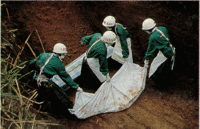-
Rapid, on-site detection of illegal cooking oils

In recent years, illegal cooking oil incident in China caused serious food safety risks. Researchers have developed two rapid and convenient colorimetric detection methods of illegal cooking oils based on phase transfer technology.
-
-
FDA shuts down more than 1,500 online pharmacies

The U.S. Food and Drug Administration (FDA) and Interpol have shutdown 1,677 online pharmacies for selling counterfeit or substandard medication and selling drugs without the necessary safeguards.
-
-
FDA warns about vulnerability of medical devices to hacking
The Food and Drug Administration (FDA) has warned manufactures of medical devices implanted into the human body, such as pacemakers and insulin pumps, to step up their cybersecurity efforts. The agency said it has discovered “cybersecurity vulnerabilities and incidents that could directly impact medical devices or hospital network operations.”
-
-
FDA-approved medications may stop deadly ebola

Ebola infections carry fatality rates of up to 90 percent. It strikes both humans and other primates, and there are fears it could be used as a biological weapon. There is no cure. New research suggests that a class of drugs that includes treatments for breast cancer and infertility appears able to inhibit the deadly, incurable Ebola virus.
-
-
The future of Colorado River flows
The Colorado River provides water for more than thirty million people, including those in the fast-growing cities of Las Vegas, Phoenix, and Los Angeles. Increasing demand for that water combined with reduced flow and the looming threat of climate change have prompted concern about how to manage the basin’s water in coming decades.
-
-
Smart technologies tackle global food shortage
From monitoring soil moisture to measuring oyster heartbeats, Aussie farmers can help to tackle the global food shortage and significantly increase their productivity by taking advantage of new smart farming technologies enabled by next generation broadband networks.
-
-
DHS wants to upgrade BioWatch, but admits the system addresses a receding threat
The BioWatch program has cost more than $1 billion so far, and DHS wants billions more for upgrading it. The system is designed to detect large-scale bioterror attacks, but DHS, in its revised assessment of bioterror threats to the United States, said that rather than a massive release of germs in an American city – the kind of attack BioWatch sensors were aimed to detect – the more likely bioterror attacks are small-scale releases of anthrax or other pathogens. Such small-scale attack would likely not be picked up by BioWatch. Lawmakers want to know whether investing billions more in the system is worthwhile.
-
-
Factors influencing spinach E. coli contamination before harvest
Researchers have identified a variety of factors that influence the likelihood of E. coli contamination of spinach on farms prior to harvest. They found that E. coli contamination of spinach on farms in Colorado and Texas was 172 times more likely if the produce field was within ten miles of a poultry farm, and sixty-four times more likely if irrigated by pond water.
-
-
New microfluidic chip useful in counterterrorism, water and food safety
A new process for making a three-dimensional microstructure that can be used in the analysis of cells could prove useful in counterterrorism measures and in water and food safety concerns. Researchers developed a new microfabrication technique to develop three-dimensional microfluidic devices in polymers. Microfluidics deals with the performance, control, and treatment of fluids that are constrained in some fashion.
-
-
Weather reports aid life-or-death decisions in Africa
The people living in sub-Saharan Africa have a life-or-death dependency on information about the weather. Knowing when, where, and what to grow or graze animals can be the difference between a bumper harvest and facing starvation. Although sub-Saharan Africa depends more directly on rainfall than any other region on Earth, the region has the fewest number of rain monitoring stations. There are also significant delays in the time between measurements being made and the resulting data being made available.
-
-
Dangerous strains of E. coli may linger longer in water
A toxin dangerous to humans may help E. coli fend off aquatic predators, enabling strains of E. coli that produce the toxin to survive longer in lake water than benign counterparts, a new study finds. The research may help explain why water quality tests do not always accurately capture water-related health risks.
-
-
Fast, reliable identification of pathogens
Life-threatening bacterial infections cause tens of thousands of deaths every year in North America, but current methods of culturing bacteria in the lab can take days to report the specific source of the infection, and even longer to pinpoint the right antibiotic that will clear the infection. Researchers have created an electronic chip that can analyze blood and other clinical samples for infectious bacteria with record-breaking speed.
-
-
Responding to public health emergencies

Over the past decade, community engagement has become a central tenet of U.S. federal approach to public health emergency preparedness. Little is known, however, about how the vision of a ready, aware, and involved populace has translated into local practice.
-
-
Studying the deadly secrets of flu, Ebola, West Nile viruses
In an effort to sort out why some viruses such as influenza, Ebola, and West Nile are so lethal, a team of U.S. researchers plans a comprehensive effort to model how humans respond to these viral pathogens. The goal of the study will be to provide a detailed molecular understanding of what occurs when these viruses infect their hosts, providing a foundation for the design and development of a new generation of drugs to thwart infection by some of the world’s most serious pathogens.
-
-
Fukushima-derived radioactivity in seafood poses minimal health risks
Researchers find that the likely doses of radioactivity ingested by humans consuming fish contaminated by radioactive radiation escaping from the debilitated Fukushima reactors fish, are comparable to, or less than, the radiological dosages associated with other commonly consumed foods, many medical treatments, air travel, and other background sources.
-
More headlines
The long view
A Shining Star in a Contentious Legacy: Could Marty Makary Be the Saving Grace of a Divisive Presidency?
While much of the Trump administration has sparked controversy, the FDA’s consumer-first reforms may be remembered as its brightest legacy. From AI-driven drug reviews to bans on artificial dyes, the FDA’s agenda resonates with the public in ways few Trump-era policies have.
